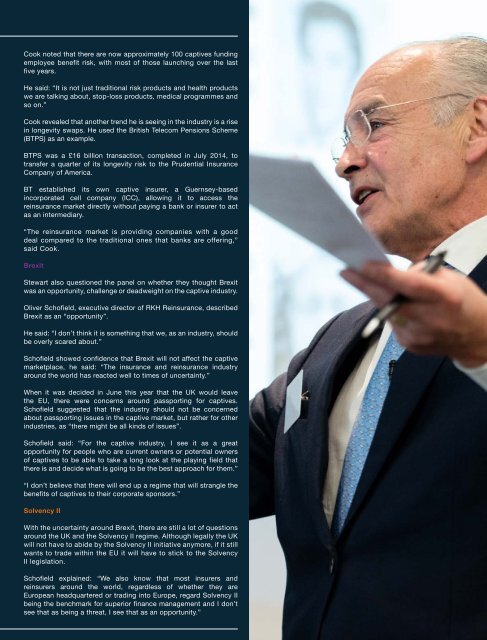The Great Guernsey
2dtvQWc
2dtvQWc
Create successful ePaper yourself
Turn your PDF publications into a flip-book with our unique Google optimized e-Paper software.
Cook noted that there are now approximately 100 captives funding<br />
employee benefit risk, with most of those launching over the last<br />
five years.<br />
He said: “It is not just traditional risk products and health products<br />
we are talking about, stop-loss products, medical programmes and<br />
so on.”<br />
Cook revealed that another trend he is seeing in the industry is a rise<br />
in longevity swaps. He used the British Telecom Pensions Scheme<br />
(BTPS) as an example.<br />
BTPS was a £16 billion transaction, completed in July 2014, to<br />
transfer a quarter of its longevity risk to the Prudential Insurance<br />
Company of America.<br />
BT established its own captive insurer, a <strong>Guernsey</strong>-based<br />
incorporated cell company (ICC), allowing it to access the<br />
reinsurance market directly without paying a bank or insurer to act<br />
as an intermediary.<br />
“<strong>The</strong> reinsurance market is providing companies with a good<br />
deal compared to the traditional ones that banks are offering,”<br />
said Cook.<br />
Brexit<br />
Stewart also questioned the panel on whether they thought Brexit<br />
was an opportunity, challenge or deadweight on the captive industry.<br />
Oliver Schofield, executive director of RKH Reinsurance, described<br />
Brexit as an “opportunity”.<br />
He said: “I don’t think it is something that we, as an industry, should<br />
be overly scared about.”<br />
Schofield showed confidence that Brexit will not affect the captive<br />
marketplace, he said: “<strong>The</strong> insurance and reinsurance industry<br />
around the world has reacted well to times of uncertainty.”<br />
When it was decided in June this year that the UK would leave<br />
the EU, there were concerns around passporting for captives.<br />
Schofield suggested that the industry should not be concerned<br />
about passporting issues in the captive market, but rather for other<br />
industries, as “there might be all kinds of issues”.<br />
Schofield said: “For the captive industry, I see it as a great<br />
opportunity for people who are current owners or potential owners<br />
of captives to be able to take a long look at the playing field that<br />
there is and decide what is going to be the best approach for them.”<br />
“I don’t believe that there will end up a regime that will strangle the<br />
benefits of captives to their corporate sponsors.”<br />
Solvency II<br />
With the uncertainty around Brexit, there are still a lot of questions<br />
around the UK and the Solvency II regime. Although legally the UK<br />
will not have to abide by the Solvency II initiative anymore, if it still<br />
wants to trade within the EU it will have to stick to the Solvency<br />
II legislation.<br />
Schofield explained: “We also know that most insurers and<br />
reinsurers around the world, regardless of whether they are<br />
European headquartered or trading into Europe, regard Solvency II<br />
being the benchmark for superior finance management and I don’t<br />
see that as being a threat, I see that as an opportunity.”


